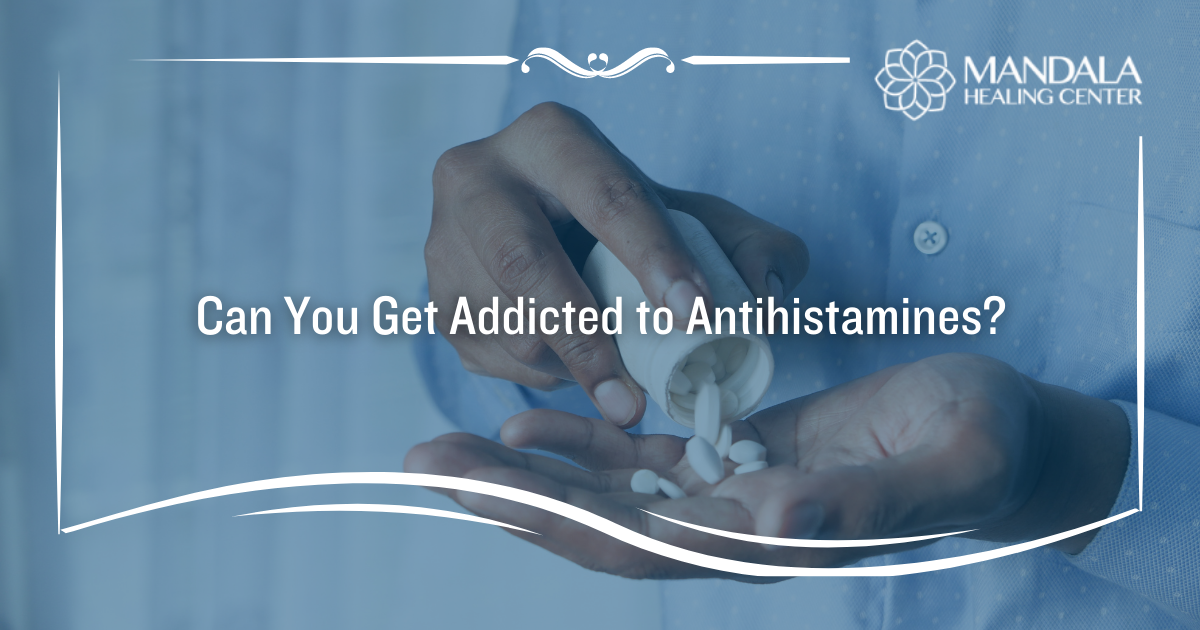When you are exposed to an allergen like pollen or pet dander, a chemical in your body known as histamine overreacts, resulting in symptoms such as sneezing, coughing, or watery eyes. Antihistamines are medications that stop your histamines from overproducing, eliminating symptoms of allergies.
Antihistamines also provide relief for other histamine-related issues, such as stomach problems, colds, anxiety, and more. While these medications are relatively safe to take, providing relief for a wide array of symptoms, some of them cause a heavy sedative effect. Some people find the sedating effects of antihistamines attractive, causing them to abuse the medication and combine it with other substances like alcohol.
While antihistamines are available over the counter and thought to be harmless, abusing this medication could lead to addiction and unintentional overdose. Being aware of the risks of antihistamine abuse and addiction could prevent you from experiencing life-threatening emergencies.
Common Antihistamine Medications
Some antihistamines are available over the counter, while others are only obtainable through a prescription. It is most common for people to abuse over-the-counter antihistamine drugs, as it is easier to obtain them. These medications come in many forms, including eye drops, capsules, liquids, and sprays.
Examples of over-the-counter antihistamines include:
- Benadryl
- Zyrtec
- Claritin
- Dimetane
- Tavist
- Alavert
Benadryl is often abused by teenagers because of how easy it is to get your hands on it. Unfortunately, this antihistamine is also commonly used during suicide attempts because the symptoms of overdose can be life-threatening and fatal.[1]
There are also prescription antihistamines that are typically prescribed to people who experience chronic allergy symptoms. Sometimes, antihistamines are used to treat other conditions like anxiety or motion sickness.
Examples of prescription antihistamines include:
- Palgic
- Optivar
- Clarinex
- Emadine
- Astelin
- Xyzal
- Livostin
- Atarax
- Astepro
Can You Get Addicted to Antihistamines?
Over-the-counter medications are commonly abused because they are cheap and easy to obtain. Antihistamines are no exception to this rule. Because antihistamines cause drowsiness and sedation, some people abuse them.
People who abuse antihistamines often combine them with other drugs like opioids, because they can increase the effects of one another. While some individuals may find the effects of these drug combinations attractive, taking antihistamines with other drugs can lead to life-threatening overdoses.
Even if you are abusing only antihistamines, doing so is still extremely dangerous. When you are taking these medications to experience a high, you will probably abuse large amounts of the drug. Despite the belief that these medications are harmless, the symptoms of an antihistamine overdose can be life-threatening and fatal in large doses.
Who is at Risk for Antihistamine Addiction?
When you imagine addiction, you probably think about a person abusing substances like heroin, crack, or cocaine. While the abuse of these substances is probably more common, certain people are at an increased risk of developing an addiction to antihistamines.
People who abuse antihistamines tend to already abuse other substances, like alcohol or tobacco. In other words, people with a pre-existing tendency for addiction and dependency are more likely to abuse antihistamines.
Other risk factors associated with antihistamine abuse and addiction include:
- Having a genetic predisposition to addiction
- Being highly impulsive
- Having mental health conditions
- Suffering from a history of abuse or trauma
- Being exposed to addiction either by your peers or parents
- Children and teens who lack parental supervision
- Starting to use antihistamines with other substances like alcohol at a young age
- Living in poverty
The above-mentioned risk factors all have something in common – emotional vulnerability. To explain, being highly impulsive, suffering from mental illness, or having a history of trauma makes you more emotionally vulnerable. In other words, you are more likely to seek out forms of self-medication to cope with your uncomfortable emotions than other people.
Symptoms of an Antihistamine Overdose
If you abuse antihistamines, you probably began using them because you believed they were safer than other drugs. While there is less of a risk of using antihistamines than other substances like heroin, taking too many of these medications can lead to a life-threatening overdose.
The symptoms of an antihistamine overdose include:
- Drowsiness
- Confusion
- Nausea
- Vomiting
- Blurred vision
- Loss of balance
- Seizures
- Coma
There have been reports of death from antihistamine overdoses. Symptoms of overdose include respiratory distress, cardiac arrest, or seizures. Overdose is most common when someone takes three to five times the recommended dosage of an antihistamine.[2]
If you suspect that someone you know is experiencing an antihistamine overdose, you must contact emergency medical services immediately. While some antihistamines only cause mild symptoms of overdose, others cause dangerous and life-threatening effects. Once they are taken to a hospital, activated charcoal can be used to absorb the antihistamines in their body and prevent fatal consequences from occurring.
Finding Help for Antihistamine Abuse and Addiction
If you or someone you love suffers from an addiction to antihistamines, help is available. Some people may believe that addiction to antihistamines is not as severe as other forms of substance use disorders. This is an extremely dangerous misconception, as antihistamine abuse can result in life-threatening overdoses.
To prevent yourself or a loved one from experiencing the consequences of antihistamine addiction, consider attending a professional addiction treatment program. Contact Mandala Healing Center today to learn more about how we can help you start your recovery journey.
References:
- https://www.tandfonline.com/doi/abs/10.1080/15563650.2021.1892716
- https://accessmedicine.mhmedical.com/content.aspx?sectionid=42069832&bookid=391












